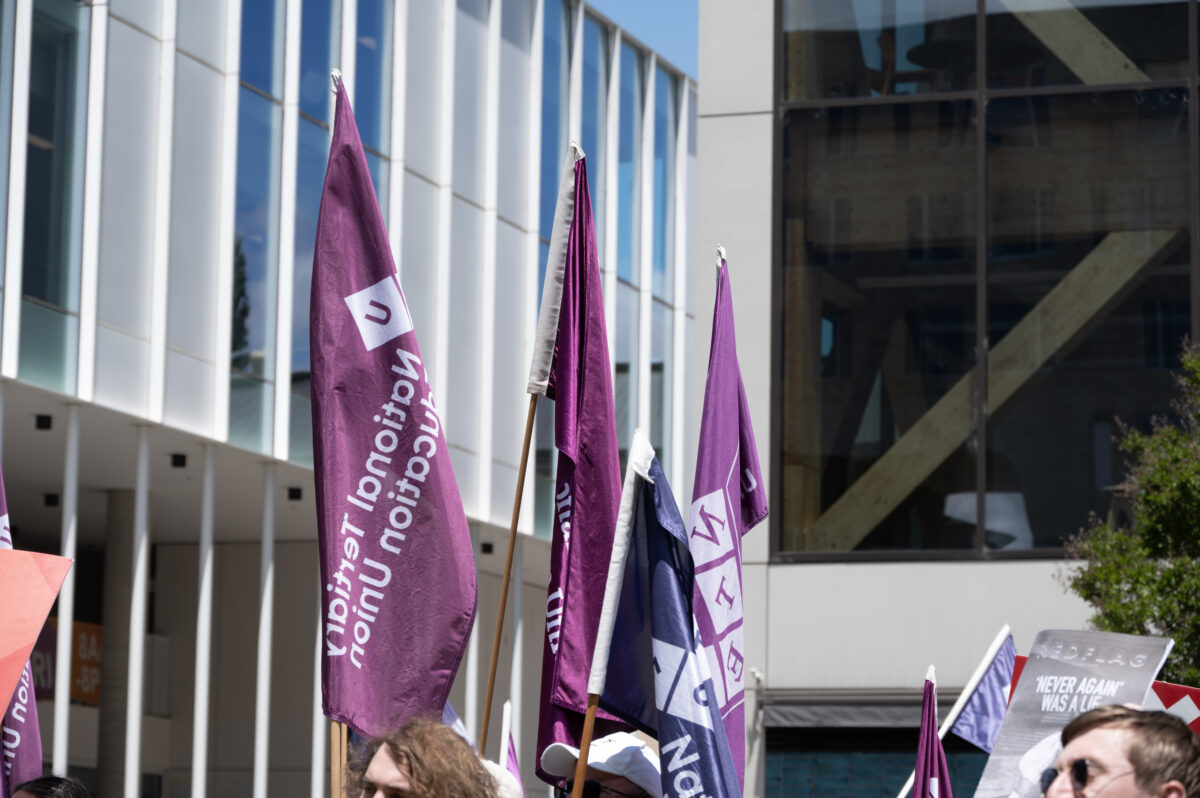On the 26th February, the National Tertiary Education Industry Union (NTEU) opened a vote of no-confidence in the leadership of the ANU Chancellor, Julie Bishop, and Vice-Chancellor, Geneveive Bell, running from 26 February to 26 March. The Union rallied at Kambri on Wednesday to mark the opening of the vote.
ACT Division Secretary for the NTEU, Dr Lachlan Clohesy, in setting out the motivations for the vote emphasised to Woroni that “the Intel job is not the only issue”, but also the “culture of fear and intimidation, the poorly explained financial situation, the poor governance practices, the job cuts, blaming staff and referring to them as “inefficiencies”, the parking fee hike, the childcare closures, calling police on student protestors, the graduation ceremony changes, the postering policy, the threats to end of year leave, $2.4 million of wage theft disclosed in 2024, and attempting to take away a staff pay increase.”
This outlook is consistent with previous sentiments of staff on campus, particularly regarding the alleged lack of respect that members of the Chancellory have given staff.
As mentioned, the University requested that staff forgo a pay increase after 600 job cuts were predicted to be in the University’s crosshairs. When asked about the pay increases, Chancellor Julie Bishop recently went on record stating to the Canberra Times that “It depends to whom you refer, because many members of staff have been part of the inefficiencies that the university is now seeking to address.”
The restructure has seen the reduction of ANU’s academic colleges from 7 to 6, with the College of Health and Medicine scrapped. According to the VC’s statement, the move was intended to make the ANU a “smaller university”, despite 2025 bringing in a larger cohort of new students than 2024.
The rally itself was focused on three speakers, Dr Clohesy, Dr Amelia Dale and Professor Inger Mewburn. Dr Clohesy opened the rally, reiterating his previous statements, but also directing anger towards the Federal Government’s international student cuts. He also condemned the ANU for failing to keep to their word, in terms of a pay rise which was cancelled.
ANUSA representatives were present at the rally, with General Secretary Sam Gorrie speaking. He emphasised that “ANUSA will always support the NTEU” and that adequate staffing was central to the university experience.
Professor Inger Mewburn stated that ANU treated the staff “like we’re fat”. Further, she compared the prospective removal of jobs to the removal of federal employees by Elon Musk’s Department of Governmental Efficiency (DOGE) in the United States, proceeding to state that it was an “Academic DOGE”.
Professor Mewbern condemned the Chancellor and Vice-Chancellor, alongside Professor John Blaxland, for using feminism as a shield, stating that women in power can just as easily partake in being “enforcers of the patriarchy” in order to “overcompensate”, and how Blaxland was hypocritical in using feminism as a defence for the actions of the Chancellor and Vice Chancellor in his article for the Canberra Times.
Speaking after Professor Mewbern, Dr Amelia Dale focussed on her role in the College of Arts and Social Sciences, who have been one of the primary targets of the job cuts. She reaffirmed that the College of Arts and Social Sciences’ “traditions were sacred” (referring to storytelling and critical thinking), and that despite the University’s claims of consultation, the staff still have very little idea as to why certain areas are being targeted more, or even whose jobs are being cut.
Dr Dale urged all of her colleagues that “we need to save our university”, encouraging those present to “Keep fighting for your education” and to “Vote No for this leadership who blames the Unions”.
Dr Dale closed her speech by referencing the final stanza of the Percy Shelly poem The Masque of Anarchy quoting the final line, “Ye are many – they are few.”
Present at the rally, a Solidarity representative spoke to Woroni about the job cuts and the impacts this will have on students, citing the examples that stating that 20% of Sociology staff might face redundancy, philosophy tutorials had been moved to fortnightly and economics tutorials had increased from eleven to thirty.
They criticised the university for coinciding these cuts with the introduction of a Nuclear Systems Major, which would be focused on Australia’s position in the American-centric AUKUS and their nuclear submarines, and the recent announcement of a Defence institute. While the latter change is somewhat to be expected, with ANU being the primary University in Australia for international and domestic security studies, “Save our Studies” condemned the “militarisation” of the ANU in the face of staff cuts and deficit. According to the campaign, “…instead of funding this warfare, Students should be assured a quality education”.
Woroni will continue to report as students and staff increasingly agitate against the prospect of cuts to university resourcing, the true extent of which remains unclear.
We acknowledge the Ngunnawal and Ngambri people, who are the Traditional Custodians of the land on which Woroni, Woroni Radio and Woroni TV are created, edited, published, printed and distributed. We pay our respects to Elders past and present. We acknowledge that the name Woroni was taken from the Wadi Wadi Nation without permission, and we are striving to do better for future reconciliation.
